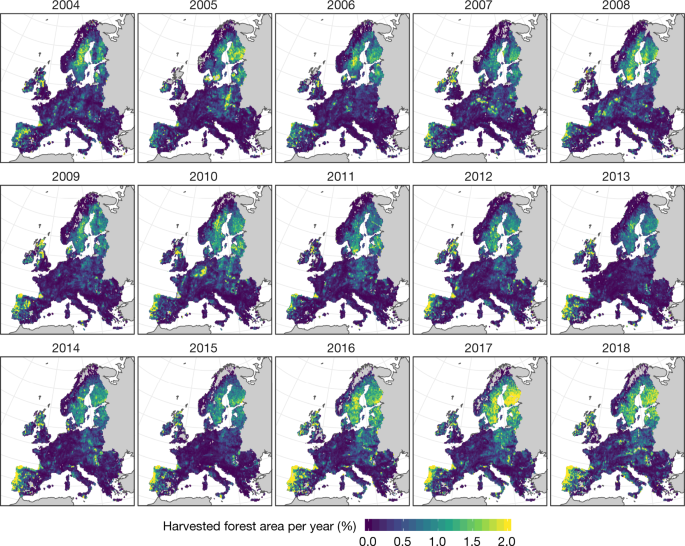
Forest Europe. State of Europe’s Forests 2015 (Ministerial Conference on the Protection of Forests in Europe, 2015); https://foresteurope.org/state-europes-forests-2015-report/.
Grassi, G. et al. The key role of forests in meeting climate targets requires science for credible mitigation. Nat. Clim. Chang. 7, 220–226 (2017).
Masson-Delmotte, V. et al. (eds) IPCC 2018: Global Warming of 1.5 °C (Intergovernmental Panel on Climate Change, 2018); https://www.ipcc.ch/sr15.
Reid, W. V. et al. Ecosystems and Human Well-being – Synthesis: A Report of the Millennium Ecosystem Assessment (Island Press, 2005).
Duncker, P. et al. Classification of forest management approaches: a new conceptual framework and its applicability to European forestry. Ecol. Soc. 17, 51 (2012).
Schelhaas, M.-J. et al. Actual European forest management by region, tree species and owner based on 714,000 re-measured trees in national forest inventories. PLoS One 13, e0207151 (2018).
European Commission. A New EU Forest Strategy: For Forests and the Forest-Based Sector Communication to the European Parliament Document no. 52013DC0659 (Publications Office of the European Union, 2013); https://eur-lex.europa.eu/legal-content/EN/ALL/?uri=CELEX:52013DC0659.
Alkama, R. & Cescatti, A. Biophysical climate impacts of recent changes in global forest cover. Science 351, 600–604 (2016).
Duveiller, G., Hooker, J. & Cescatti, A. The mark of vegetation change on Earth’s surface energy balance. Nat. Commun. 9, 679 (2018).
Luyssaert, S. et al. Trade-offs in using European forests to meet climate objectives. Nature 562, 259–262 (2018); correction 567, E13 (2019).
Le Quéré, C. et al. Global carbon budget 2017. Earth Syst. Sci. Data 10, 405–448 (2018).
Shukla, P. R. et al. (eds) IPCC, 2019: Climate Change and Land (Intergovernmental Panel on Climate Change, 2019); https://www.ipcc.ch/srccl.
United Nations Framework Convention on Climate Change. The Paris Agreement (United Nations, 2015); https://unfccc.int/process-and-meetings/the-paris-agreement/the-paris-agreement.
European Commission. The European Green Deal Communication to the European Parliament Document no. 52019DC0640 (Publications Office of the European Union, 2019); https://eur-lex.europa.eu/legal-content/EN/TXT/?uri=COM%3A2019%3A640%3AFIN.
Mandl, N. & Pinterits, M. (eds) Annual European Union Greenhouse Gas Inventory 1990–2016 and Inventory Report 2018. EAA Report no. 5/2018 (European Environment Agency, 2018); https://www.eea.europa.eu/publications/european-union-greenhouse-gas-inventory-2018.
Bastrup-Birk, A. et al. European Forest Ecosystems – State and Trends. EAA Report No. 5/2016 (European Environment Agency, 2016); https://www.eea.europa.eu/publications/european-forest-ecosystems.
Pilli, R., Grassi, G., Kurz, W. A., Viñas, R. A. & Guerrero, N. H. Modelling forest carbon stock changes as affected by harvest and natural disturbances. I. Comparison with countries’ estimates for forest management. Carbon Balance Manag. 11, 5 (2016).
Nabuurs, G.-J. et al. First signs of carbon sink saturation in European forest biomass. Nat. Clim. Chang. 3, 792–796 (2013).
Kallio, A. M. I. & Solberg, B. On the reliability of international forest sector statistics: problems and needs for improvements. Forests 9, 407 (2018).
Buongiorno, J. On the accuracy of international forest product statistics. Forestry 91, 541–551 (2018).
Hansen, M. C. et al. High-resolution global maps of 21st-century forest cover change. Science 342, 850–853 (2013).
Gorelick, N. et al. Google Earth Engine: planetary-scale geospatial analysis for everyone. Remote Sens. Environ. 202, 18–27 (2017).
Grassi, G., Pilli, R., House, J., Federici, S. & Kurz, W. A. Science-based approach for credible accounting of mitigation in managed forests. Carbon Balance Manag. 13, 8 (2018).
Ericsson, K. & Werner, S. The introduction and expansion of biomass use in Swedish district heating systems. Biomass Bioenergy 94, 57–65 (2016).
Bontemps, S. et al. Consistent global land cover maps for climate modeling communities: current achievements of the ESA’s land cover CCI. In ESA Living Planet Symp. 2013 CCI-4 (ESA, 2013).
Wolf-Crowther, M., Mozes, C. & Laczko, R. (eds) Forestry in the EU and the World: A Statistical Portrait (Eurostat, 2011); https://ec.europa.eu/eurostat/web/products-statistical-books/-/KS-31-11-137.
Santoro, M. GlobBiomass – Global Datasets of Forest Biomass https://pangaea.de/10.1594/PANGAEA.894711 (PANGAEA, 2018).
Noss, R. F. Assessing and monitoring forest biodiversity: a suggested framework and indicators. For. Ecol. Manage. 115, 135–146 (1999).
Wilcox, B. A. & Murphy, D. D. Conservation strategy the effects of fragmentation on extinction. Am. Nat. 125, 879–887 (1985).
FAOSTAT. Forest Land (Food and Agriculture Organization of the United Nations, 2019); http://www.fao.org/faostat/en/#data/GF.
Levers, C. et al. Drivers of forest harvesting intensity patterns in Europe. For. Ecol. Manage. 315, 160–172 (2014).
Eurostat. Economic Aggregates of Forestry https://appsso.eurostat.ec.europa.eu/nui/show.do?dataset=for_eco_cp&lang=en (2019).
Forestry and Timber – UNECE. Forest Products Annual Market Review, 2017–2018 (United Nations, 2018); https://www.unece.org/forests/fpamr2018.html.
European Commission. Bioeconomy: the European way to use our natural resources (European Commission, 2018); https://ec.europa.eu/knowledge4policy/node/33002_es.
European Parliament. The Promotion of the Use of Energy from Renewable Sources Directive of the European Parliament Document no. 32018L2001 (Publications Office of the European Union, 2018); https://eur-lex.europa.eu/legal-content/EN/TXT/?uri=CELEX%3A32018L2001.
Searchinger, T. D. et al. Europe’s renewable energy directive poised to harm global forests. Nat. Commun. 9, 3741 (2018).
European Parliament. The Inclusion of Greenhouse Gas Emissions and Removals from Land Use, Land Use Change and Forestry in the 2030 Climate and Energy Framework Regulation of the European Parliament Document no. 32018R0841 (Publications Office of the European Union, 2018); https://eur-lex.europa.eu/legal-content/EN/TXT/?uri=uriserv:OJ.L_.2018.156.01.0001.01.ENG.
Achard, F. et al. Determination of tropical deforestation rates and related carbon losses from 1990 to 2010. Glob. Change Biol. 20, 2540–2554 (2014).
Gibbs, H. K., Brown, S., Niles, J. O. & Foley, J. A. Monitoring and estimating tropical forest carbon stocks: making REDD a reality. Environ. Res. Lett. 2, 045023 (2007).
Hansen, M. C., Stehman, S. V. & Potapov, P. V. Quantification of global gross forest cover loss. Proc. Natl Acad. Sci. USA 107, 8650–8655 (2010).
Nabuurs, G.-J. et al. Next-generation information to support a sustainable course for European forests. Nat. Sustain. 2, 815–818 (2019).
European Space Agency. Copernicus Open Access Hub https://scihub.copernicus.eu (2015).
Zhu, Z. et al. Benefits of the free and open Landsat data policy. Remote Sens. Environ. 224, 382–385 (2019).
European Commission. Stepping Up EU Action to Protect and Restore the World’s Forests Communication to the European Parliament Document no. 52019DC0352 (European Commission, 2019); https://eur-lex.europa.eu/legal-content/EN/TXT/?uri=CELEX%3A52019DC0352.
UNFCCC. Report of the Conference of the Parties on its Seventh Session (United Nations Framework Convention on Climate Change, 2001); http://unfccc.int/resource/docs/cop7/13a01.pdf.
Potapov, P. V. et al. Eastern Europe’s forest cover dynamics from 1985 to 2012 quantified from the full Landsat archive. Remote Sens. Environ. 159, 28–43 (2015).
Food and Agriculture Organization of the United Nations. Global Forest Resources Assessment 2015 (Food and Agriculture Organization of the United Nations, 2015); http://www.fao.org/forest-resources-assessment/en/.
Tyukavina, A. et al. Types and rates of forest disturbance in Brazilian Legal Amazon, 2000–2013. Sci. Adv. 3, e1601047 (2017).
McNicol, I. M., Ryan, C. M. & Mitchard, E. T. A. Carbon losses from deforestation and widespread degradation offset by extensive growth in African woodlands. Nat. Commun. 9, 3045 (2018).
Baccini, A., Walker, W., Carvalho, L., Farina, M. & Houghton, R. A. Response to Comment on “Tropical forests are a net carbon source based on aboveground measurements of gain and loss”. Science 363, eaat1205 (2019).
Ballin, M., Barcaroli, G., Masselli, M. & Scarnó, M. Redesign Sample for Land Use/Cover Area Frame Survey (LUCAS) 2018 (Eurostat, 2018).
EFFIS. Statistics Portal https://effis.jrc.ec.europa.eu/static/effis.statistics.portal (EFFIS, 2019).
Gardiner, B. et al. Destructive Storms in European Forests: Past and Forthcoming Impacts (European Forest Institute, 2010).
Hengeveld, G. et al. A Forest Management Map of European Forests. Ecol. Soc. 17, 53 (2012).
Vaahtera, E. et al. Finnish Forest Statistics (Natural Resources Institute Finland (Luonnonvarakeskuksen), 2018); http://jukuri.luke.fi/handle/10024/543098.
Sweden Statistical Database http://pxweb.skogsstyrelsen.se/pxweb/en/Skogsstyrelsens%20statistikdatabas/?rxid=c8c5a437-bd93-4972-8060-50ea3026db1b (2019).
National Forestry Accounting Plan for Austria (Bundesministerium Nachhaltigkeit und Tourismus, 2018); https://www.fern.org/fileadmin/uploads/fern/Documents/NFAP_Austria.pdf.
Foglar-Deinhardstein, A., Hangler, J. & Prem, J. (eds) Sustainable Forest Management in Austria, Austrian Forest Report 2008 (Federal Ministry of Agriculture, Republic of Austria, 2008).
Institut Européen De La Forêt Cultivée. Forestorm http://www.iefc.net/storm/.
Stoeva, L., Markoff, I. & Zhiyanski, M. National Forestry Accounting Plan for Bulgaria, Including Forest Reference Levels for the Period 2021–2025 (Ministry of Environment and Water, Republic of Bulgaria, 2018); https://www.moew.government.bg/static/media/ups/articles/attachments/NFAP_final_ENe30a12d4d7dff0f589ad84b69bb90b12.pdf.
National Forestry Accounting Plan For The Republic Of Croatia (Ministry of Environment and Energy and Ministry of Agriculture, Republic of Croatia, 2018); https://mzoe.gov.hr/UserDocsImages//KLIMA/SZKAIZOS//NFAP_Croatia.pdf.
Ministry of Agriculture & Ministry of the Environment, Czech Republic. National Forestry Accounting Plan For The Czech Republic, Including A Proposed Forest Reference Level (Ministry of Agriculture and Ministry of the Environment, Czech Republic, 2018); https://www.fern.org/fileadmin/uploads/fern/Documents/NFAP_Czech_Republic.pdf.
Cienciala, E. et al. Recent spruce decline with biotic pathogen infestation as a result of interacting climate, deposition and soil variables. Eur. J. For. Res. 136, 307–317 (2017).
Johannsen, V. K., Nord-Larsen, T., Scott Bentsen, N. & Vesterdal, L. Danish National Forest Accounting Plan 2021–2030 (University of Copenhagen, 2019); https://efkm.dk/media/12542/danishnationalforestaccountingplan_2019.pdf.
Finnish Forest Sector Economic Outlook https://www.luke.fi/en/finnish-forest-sector-economic-outlook/ (2019).
Somogyi, Z. et al. National Forest Accounting Plan of Hungary (2021–2025) (2018); https://cdr.eionet.europa.eu/hu/eu/mmr/lulucf/envxbyrxa/.
Gasparini, P., Di Cosmo, L., Cenni, E., Pompei, E. & Ferretti, M. Towards the harmonization between National Forest Inventory and Forest Condition Monitoring. Consistency of plot allocation and effect of tree selection methods on sample statistics in Italy. Environ. Monit. Assess. 185, 6155–6171 (2013).
State Forest Service, Environment Protection and Forest Department & Aleksandras Stulginskis University. National Forestry Accounting Plan by Lithuania (Ministry of the Environment, 2018); https://www.fern.org/fileadmin/uploads/fern/Documents/NFAP_Lituania.pdf.
FAOSTAT. Forestry Production and Trade http://www.fao.org/faostat/en/#data/FO (Food and Agriculture Organization of the United Nations, 2019).
Ministry of the Environment. Poland National Forestry Accounting Plan (NFAP) (2018); https://bip.mos.gov.pl/fileadmin/user_upload/bip/strategie_plany_programy/Krajowy_Plan_Rozliczen_dla_Lesnictwa/NFAP_2018_POLAND_ENG_FINAL.pdf.
Barka, I., Priwitzer, T. & Hušťáková, E. National Forestry Accounting Plan of the Slovak Republic Including a Proposed Forest Reference Level (Ministry of Agriculture and Rural Development of the Slovak Republic, National Forest Centre, 2018); http://www.mpsr.sk/out.php?urlid=77.
National Forestry Accounting Plan for Spain (2018); https://www.miteco.gob.es/es/cambio-climatico/temas/mitigacion-politicas-y-medidas/nfap_env20_tcm30-506250.pdf.
United Nations Climate Change. National Inventory Submissions 2019 https://unfccc.int/process-and-meetings/transparency-and-reporting/reporting-and-review-under-the-convention/greenhouse-gas-inventories-annex-i-parties/national-inventory-submissions-2019 (UNFCCC, 2019).
Nabuurs, G.-J., Arets, E. J. M. M. & Schelhaas, M.-J. Understanding the implications of the EU-LULUCF regulation for the wood supply from EU forests to the EU. Carbon Balance Manag. 13, 18 (2018).
Joint Research Centre. Brief on Biomass for Energy in the European Union (European Commission, 2019); http://publications.jrc.ec.europa.eu/repository/bitstream/JRC109354/biomass_4_energy_brief_online_1.pdf.
Hoepffner, N. et al. Biomass Production, Supply, Uses and Flows in the European Union: First Results From an Integrated Assessment (European Commission, 2018); https://publications.europa.eu/en/publication-detail/-/publication/358c6d4b-1783-11e8-9253-01aa75ed71a1/language-en.
Slovenian National Forestry Accounting Plan, Including Forest Reference Levels – Draft (2018); https://www.fern.org/fileadmin/uploads/fern/Documents/NFAP_Slovenia_translated.pdf.
National Forestry Accounting Plan for Sweden (2018); https://www.regeringen.se/495799/contentassets/38eaf6f23f284fb0a440b0742fe7bcf7/national-forestry-accounting-plan-for-sweden.pdf.
Grassi, G. et al. Wrong premises mislead the conclusions by Kallio et al. on forest reference levels in the EU. For. Policy Econ. 95, 10–12 (2018).
Kallio, A. M. I., Solberg, B., Käär, L. & Päivinen, R. Economic impacts of setting reference levels for the forest carbon sinks in the EU on the European forest sector. For. Policy Econ. 92, 193–201 (2018).
Source: Ecology - nature.com



